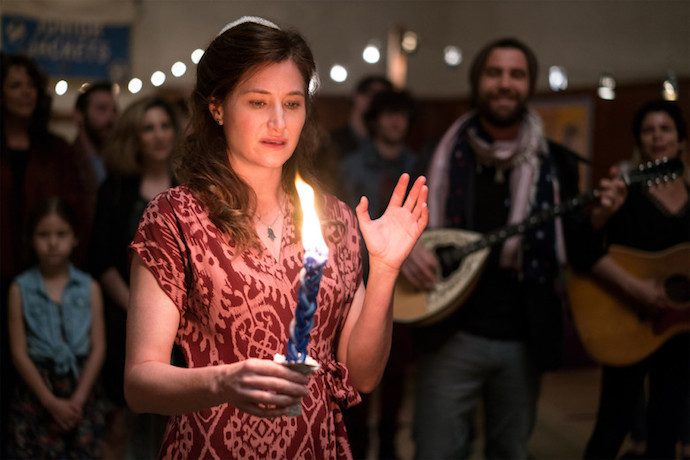Last Saturday night, many American Jews ushered in the fall High Holy Days of teshuvah, or repentance, by attending special selichot services, praying and heeding the call of the shofar. The rest of us? We were home watching the new season of Transparent.
This seems entirely appropriate, even if it does have its ironies. Repentance was actually the core theme of season two. This year, our fall present from Jill Soloway came wrapped up in delightfully maror-scented, Exodus-colored bow. Soloway doesn’t just give us a trans torah—she queers our Jewish ritual year, too, and delightfully so.
It’s a season of seeking. Josh faces tragedy, hits the road, and then is briefly born again, muttering a broken, quietly-hysterical “okay?” in response to an evangelical altar call. At her dentist’s office, Ali is getting high on nitrous oxide, having mystical visions of the shechinah and a black female goddess who presides over a cosmic game of Wheel of Fortune. The whole crazy mess ends with the five principals on a cruise ship, holding a poignant impromptu seder, strewing heartbreak, Spanx, and ashes in their wake.
But it’s Rabbi Raquel—now promoted to series regular—who speaks to me most fiercely at this turning of the Jewish year. It’s her voice we hear before the first fade-in of the season; her face, practicing a sermon, that we first see. “Thoughts on Passover. You wake up, with two words emblazoned on your chest. It’s time. You’re gonna make a break for freedom. You will not be a slave anymore.”
But she isn’t feeling free: she’s trapped in a deep depression. Midway through the season, Rabbi Raquel has an epic breakdown in the days leading up to Passover. She’s preparing for a seder and conversing with Sarah, the eldest Pfefferman sibling. Sarah has been having some contact highs with Judaism throughout season, while Raquel has experienced a downward spiral, “gutted” after a miscarriage and a breakup (not to mention some disastrously unsexy sex with the too-earnest Cantor Duvid).
Sarah tells an already agitated Raquel that Jewish ritual makes her want to get back together with her ex-husband, and that “Jewy stuff” makes her feel sexy: “I feel, just, like, inspired by all this spirituality,” she babbles preciously. Rabbi Raquel, who has reached some kind of nadir, roars: “IT’S NOT SPIRITUALITY!”
She demands that Sara clarify just what she means by “spirituality.” Sarah fumbles. With prophetic rage, Rabbi Raquel continues:
Cause I can tell you what it’s not. It’s not changing your mind whenever you feel like it. It’s not following your bliss. It’s not finding yourself by crawling through your belly button and out your own asshole and calling it a journey.
Then she curses some more and declares she won’t do the seder, not even if moshiach comes. “Who’s moshiach?” asks Sarah. “The fucking messiah!!!” Raquel roars. She ends up curled up on the floor, rocking back and forth, muttering, panicking, a worried Sarah and Cantor Duvid at her side.
In other words: Promised Lands are hard to get to. The Pfeffermans want their “spirituality” the way so many of us do: easy and light. Escapist. Ideally, with pupusas on the side.
A long car ride is fine, as long as it’s air-conditioned. Josh arrives at the Kansas home of his son Colton’s adoptive family, desperate after a series of losses. He is primed for a come-to-Jesusland moment, even if he takes it back almost instantly. Ali, tripping on gematria and laughing gas, has concluded that she wants to write about “intersectionality as the wholly/holy other.” (I don’t have a shooting script; pick whichever side of that pun you’d like). “You sound nuts,” her girlfriend Leslie replies.
Jesus, pupusas, and intersectionality all sound grand, but Rabbi Raquel knows that the biblical stories of exodus are long, gritty, and filled with uncertainty and fear. On the way to Canaan, sometimes the earth opens up and swallows people. Sometimes Israelites run other Israelites through with swords. Sometimes, you run out of water.
She also knows that Moses doesn’t even get in. All the way back in season 1, she reminded her congregation that “it’s only those that were born free, that were born in the wilderness—that get to see the promised land.”
This fall in America, the promised land feels far away—particularly for those of us in female, or black, or trans bodies. The ones in Ali’s visions. Teshuvah, at its root, means “turning.” To turn freely we need space. We need to be able to breathe. When I reflect on our current crises of police violence, racism, transphobia, Islamophobic attacks, and sexism—to name just a few items—I feel as if we are stuck in the narrow straits, in mitzrayim—a space that does not allow for much turning, “spiritual” or otherwise. It chokes me up and makes it hard to speak. So I’m writing about a TV show. Or am I?
On Transparent, Soloway turns us out of the desert and towards the water in search of that kind of space. Raquel closes her season with a dip in the mikvah. Ali and Maura join their raised hands as they address the fathomless sea. LA is a la la land of both/and: desert and ocean; rich and poor; and oh so many colors and genders of people.
And moshiach? That one seems to be up to us. At the close of the stunning season opener, Rabbi Raquel’s voice asks us: “What if you had to be your own messiah?” Near the season’s end, Ali, Our Lady of Perpetual Intersectionality, looks to those who are “female, black, trans, any kind of other that the patriarchy would try to objectify or silence … And what if that otherness were the messiah?”
What if, indeed? What if we are not alone in the wilderness? What if we met that holy/wholly other—without romanticizing her or doing violence to her, or in her name?
To mix my game show metaphors: I’ll take the I-thou for $400, Alex. A sweet, free-floating New Year to all.





